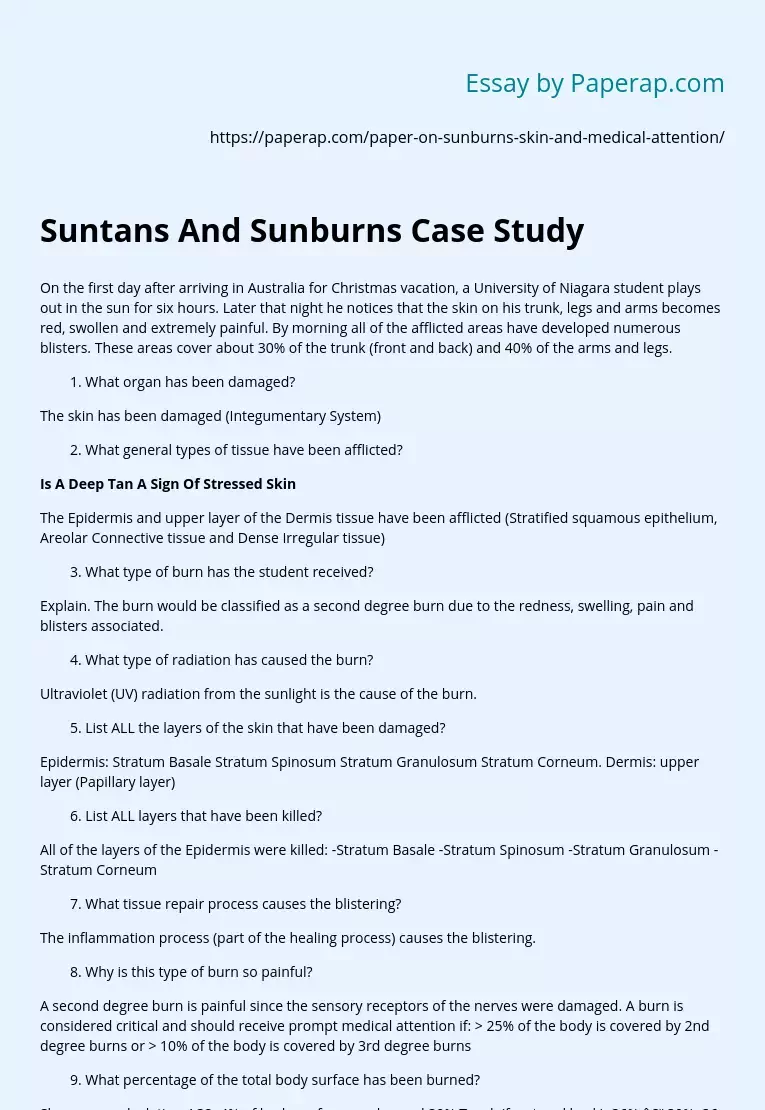On the first day after arriving in Australia for Christmas vacation, a University of Niagara student plays out in the sun for six hours. Later that night he notices that the skin on his trunk, legs and arms becomes red, swollen and extremely painful. By morning all of the afflicted areas have developed numerous blisters. These areas cover about 30% of the trunk (front and back) and 40% of the arms and legs.
1. What organ has been damaged?
The skin has been damaged (Integumentary System)
2. What general types of tissue have been afflicted?
Is A Deep Tan A Sign Of Stressed Skin
The Epidermis and upper layer of the Dermis tissue have been afflicted (Stratified squamous epithelium, Areolar Connective tissue and Dense Irregular tissue)
3. What type of burn has the student received?
Explain. The burn would be classified as a second degree burn due to the redness, swelling, pain and blisters associated.
4. What type of radiation has caused the burn?
Ultraviolet (UV) radiation from the sunlight is the cause of the burn.
5. List ALL the layers of the skin that have been damaged?
Epidermis: Stratum Basale Stratum Spinosum Stratum Granulosum Stratum Corneum. Dermis: upper layer (Papillary layer)
6. List ALL layers that have been killed?
All of the layers of the Epidermis were killed: -Stratum Basale -Stratum Spinosum -Stratum Granulosum -Stratum Corneum
7. What tissue repair process causes the blistering?
The inflammation process (part of the healing process) causes the blistering.
8. Why is this type of burn so painful?
A second degree burn is painful since the sensory receptors of the nerves were damaged.
A burn is considered critical and should receive prompt medical attention if: > 25% of the body is covered by 2nd degree burns or > 10% of the body is covered by 3rd degree burns
9. What percentage of the total body surface has been burned?
Show your calculations! 32. 4% of body surface was burned 30% Trunk (front and back): 36% – 30% .36 * . 30 =0. 108 =10. 8% 40% Arms and Legs: (36 ant/pos legs + 18 ant/pos arms = 54) 54% – 40% .54 * . 40 =0. 216 =21. 6% 21. 6% + 10. 8% = 32. 4%
10. Is the burn critical? Should the student seek medical attention?
Yes the burn would be considered critical since more than 25% of the total body surface was burned. The student does need to seek medical attention immediately!
11. List all of the body functions that may be disrupted by such a burn.
- The body’s Homeostatic mechanism may have been disrupted (Integumentary)
- Inability to sweat which cools the body down (Nervous)
- Cell regeneration may have been disrupted due to oxygen not being distributed properly (Respiratory)
- Dehydration due to the lack of volume in the blood flow (Cardiovascular)
- The inability to flush waste due to dehydration may have been disrupted as well (Urinary)
- Muscle movement which produces heat along with joint mobility limits (Muscular).
- Proteins and other elements for the body’s immune system response system could very well be disrupted (Lymphatic) Recovery
12. After a few days the skin peels and the burned areas begin to heal.
The student notices that the healing areas are more susceptible to injuries due to chafing or trauma. What has happened to the skin that would cause this increased susceptibility? Damage causes Elastin Fibers to clump which in turn can cause a leather type appearance. DNA changes of the skin cells can cause skin cancer and temporarily depress the immune system. The skin layers that were affected by the burn are normally tough but since they were damaged, they are thin, likely susceptible to more injury. During the next week after the student returns to the States, his friend tells him that a sunburn prepares his skin for a deep tan. His friend encourages him to quickly begin tanning sessions at a local tanning salon before the effects of the burn wear off.
13. What would you advise him to do? Why?
I would not advise the student to undergo tanning sessions because this could cause serious, extensive pigmentation changes. I would suggest that he keep the burn cool (do NOT use cold water because this could cause further damage to the wound) and cover it with a gauze. Let the wound air dry if possible before applying gauze. I would also advise the student that he could take over the counter pain medications. The student may also apply prescription ointments if prescribed but do not use oils or butters. Definitely tell him to NOT break the blisters because it could cause infection to the open sore, not to mention scaring. Last, the student will need to get a tetanus shot if he has not had one in the past 5 years because burn wounds are more prone to tetanus. Burned skin is only considered sterile the first 24 hours. The student will also need to keep an adequate diet. He will need thousands of nutrients and liquids to heal the body in order to replace those that were lost.
14. Is a deep tan a sign of skin that is healthy or severely stressed?
Explain your answer. A deep tan is a sign of severely stressed skin. The deepness is a reflection of the overprotection of melanin to protect the bodies DNA of the skin. When repeat damage is done, melanin is compromised and considered useless.
References:
- Epstein, Ervin, et al. “Metastases from squamous cell carcinomas of the skin.” Archives of dermatology 97.3 (1968): 245-251.
- Heukelbach, Jörg, et al. “Parasitic skin diseases: health care‐seeking in a slum in north‐east Brazil.” Tropical Medicine & International Health 8.4 (2003): 368-373.
Suntans And Sunburns Case Study. (2019, Dec 05). Retrieved from https://paperap.com/paper-on-sunburns-skin-and-medical-attention/

